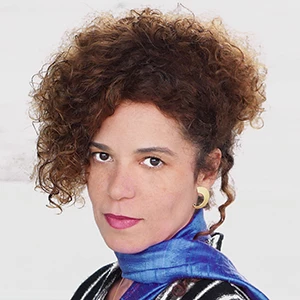Dr. Thania Paffenholz is the Director of the Inclusive Peace & Transition Initiative. With over 25 years of experience as both an academic and policy advisor, Dr. Paffenholz is internationally renowned for her work on and in support of peace and political transition processes, focusing on mediation and peacebuilding, process design, inclusion and participation, as well as the conditions under which these processes produce sustainable outcomes. In recognition of her work, Dr. Paffenholz received the prestigious Wihuri International Prize in 2015. Dr. Paffenholz has roots in Europe, Africa and Asia.
Academic Training & Professional Experience
A political scientist by training, Dr. Paffenholz received her Ph.D. in international relations from the University of Frankfurt, Germany in 1996, focusing on the theory and practice of mediation and peace processes in armed conflicts. As a research fellow at the Peace Research Institute Frankfurt (1992-1996), she participated in several UN missions in Africa. From 1996 to 2000, Dr. Paffenholz was the peacebuilding advisor to the EU Special Envoy to Somalia at the Delegation of the European Commission in Kenya. She then served as the founding director of the Center for Peacebuilding at swisspeace in Berne, advising the Swiss Foreign Ministry. Since 2005, Dr. Paffenholz has worked with the Graduate Institute in Geneva, leading research projects on participation and inclusion in peace and transition processes.
Academic Research & Involvement in Peace and Transition Processes
Dr. Paffenholz publishes regularly and sits on the editorial board of key academic journals as well as steering committees and advisory boards of peacebuilding organizations. Alongside her research, she remains active in support of peace and political transition processes. From 1992 to the present day Dr. Paffenholz has supported peace processes in Mozambique, Angola, Somalia, Kenya, Uganda, South Sudan, Mali, Afghanistan, Nepal, Sri Lanka, Myanmar, Yemen, Egypt, El Salvador, Syria, and Colombia. Her work has seen her engage with peace processes at all levels, working with and alongside international organizations, governments, NGOs, conflict parties and civil society. Due to her extensive experience and knowledge, Dr. Paffenholz’s advice is sought by UN agencies, the EU, the OSCE, the OECD/DAC as well as governments and non-governmental organizations.
Selected Publications:
Academic Training & Professional Experience
A political scientist by training, Dr. Paffenholz received her Ph.D. in international relations from the University of Frankfurt, Germany in 1996, focusing on the theory and practice of mediation and peace processes in armed conflicts. As a research fellow at the Peace Research Institute Frankfurt (1992-1996), she participated in several UN missions in Africa. From 1996 to 2000, Dr. Paffenholz was the peacebuilding advisor to the EU Special Envoy to Somalia at the Delegation of the European Commission in Kenya. She then served as the founding director of the Center for Peacebuilding at swisspeace in Berne, advising the Swiss Foreign Ministry. Since 2005, Dr. Paffenholz has worked with the Graduate Institute in Geneva, leading research projects on participation and inclusion in peace and transition processes.
Academic Research & Involvement in Peace and Transition Processes
Dr. Paffenholz publishes regularly and sits on the editorial board of key academic journals as well as steering committees and advisory boards of peacebuilding organizations. Alongside her research, she remains active in support of peace and political transition processes. From 1992 to the present day Dr. Paffenholz has supported peace processes in Mozambique, Angola, Somalia, Kenya, Uganda, South Sudan, Mali, Afghanistan, Nepal, Sri Lanka, Myanmar, Yemen, Egypt, El Salvador, Syria, and Colombia. Her work has seen her engage with peace processes at all levels, working with and alongside international organizations, governments, NGOs, conflict parties and civil society. Due to her extensive experience and knowledge, Dr. Paffenholz’s advice is sought by UN agencies, the EU, the OSCE, the OECD/DAC as well as governments and non-governmental organizations.
Selected Publications:
- "Unpacking the local turn in peacebuilding: a critical assessment towards an agenda for future research." Third World Quarterly 36, no. 5 (2015): 857-74.
- “Civil Society and Peace Negotiations: Beyond the Inclusion-Exclusion Dichotomy.” Negotiation Journal 30, no.1 (January 2014): 69-91.
- “International Peacebuilding Goes Local: Analysing Lederach’s Conflict Transformation Theory and its Ambivalent Encounter with 20 years of Practice, in Peacebuilding.” Taylor and Francis 2, no.1 (January 2014): 11-27.
- Civil society & peacebuilding. Boulder, Colo.: Lynne Rienner, 2010.
- “Civil Society and Peacebuilding.” CCDP Working Paper 4: Geneva, 2009.
- With Luc Reychler. Aid for Peace: A Guide to Planning and Evaluation for Conflict Zones, Baden-Baden: Nomos, 2007.
- With Luc Reychler. Peacebuilding: A Field Guide. Boulder: Lynne Rienner Publishers, 2000. (French: Construire la paix sur le terrain; Mode d’emploi (2000) Bruxelles: Groupe de recherche et d'information sur la paix et la sécurité).

